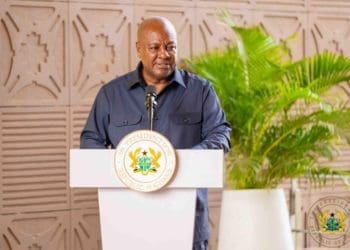The Governor of the Bank of Ghana (BoG), Dr Johnson Asiama, has delivered an unflinching reflection on the burdens and responsibilities of central banks leadership, urging African monetary authorities to strengthen credibility, communication, and collaboration as the continent navigates its next phase of economic recovery.
Speaking at the opening of the Pan-African Central Bank Governors’ Conference in Accra, which the BoG hosted in partnership with the Bank of England and the UK Foreign, Commonwealth and Development Office (FCDO), Dr Asiama said the role of central banks is evolving beyond technical policymaking into one defined by public trust and institutional integrity.
“We gather not as policymakers behind podiums, but as custodians of public trust,” he told a packed audience of African governors and international financial regulators.
“Leading a central bank has never been for the faint-hearted. We balance data with intuition, independence with coordination, and sometimes, optimism with insomnia.”

He admitted candidly that central bank leadership comes at a personal price — “you never sleep the same again” — and described the sleepless vigilance of modern governors who now “check their phones not for messages, but for markets.”
Balancing the impossible
Dr Asiama outlined five dimensions that test central bank leadership: economic complexity, political economy, market volatility, public opinion, and technological disruption.
He explained that monetary policy now demands the ability to “translate models into judgment, and judgment into policy” in real time, often with “imperfect data and impatient citizens.”

Political pressures, he said, further complicate the job: “Governments seek growth, politicians seek results, businesses seek credit, markets seek signals, and the public seeks relief — yet our duty is to defend the long-term horizon when everyone else is watching the next quarter.”
Market turbulence, he warned, remains a “constant companion,” with sentiment capable of changing “before sunrise.” Central bankers, he said, must act “with speed but never haste; with prudence but never paralysis.”
The Governor also noted that the “court of public opinion” now wields enormous influence, as monetary decisions are dissected instantly across media platforms.
“Unpopular decisions, even when right, test not just our policies but our composure,” he said, stressing the need for clarity and humility in communication.

On technology, Dr Asiama cautioned that artificial intelligence, digital currencies, and cross-border payment systems are “redefining the context in which we execute our mandate.” Central banks, he said, “must adapt swiftly or risk losing relevance.”
A candid forum for reflection
Held under the theme “Central Bank Governance: Leadership, Credibility, and Resilience in African Central Banking,” the two-day conference (10–11 November 2025) sought to deepen collaboration among African central banks through open dialogue rather than formal speeches.
According to organisers, the event provided a “closed-door forum for honest reflection among peers” — an opportunity for governors to share experiences in managing crises, balancing independence and accountability, and building resilient institutions amid political and economic turbulence.
Dr Asiama said the aim was “not to deliver lectures, but to exchange truths,” stressing that the lessons of credibility and discipline “cannot be taught in textbooks — they must be lived.”
He cited Ghana’s recent recovery as proof that discipline works.

Ghana’s recovery as a case study
Reflecting on Ghana’s difficult path to stability, Dr Asiama recalled that only three years earlier, the country faced what the World Bank called a “home-grown crisis,” with inflation at 54.1%, the cedi losing half its value, and foreign reserves falling below one month of import cover.
“When my team and I assumed office in 2025, our single focus was stabilisation,” he said. “We tightened policy, sterilised liquidity, and spoke frankly with markets and citizens alike. Behind those numbers is the story of a country that chose discipline over despair.”
Today, Ghana’s macroeconomic indicators tell a different story. Inflation has fallen to 8 percent, the first single-digit figure since 2021; reserves have rebounded to US$11.4 billion (4.8 months of import cover); the cedi has appreciated 34.9 percent year-to-date, reversing the 19.2% depreciation of 2024; and the trade surplus has tripled to US$6.2 billion in the first eight months of 2025.
“Our stability is real — but it is still young, still being tested,” he cautioned. “Credibility and transparency work. Discipline works. And perhaps most importantly, patience works.”
Leadership, communication, and collaboration
The Governor argued that the real test of leadership is not in numbers, but in moments of uncertainty when “models fail and everyone wants certainty you cannot yet prove.”
He praised African central banks for responding decisively to global inflation shocks between 2022 and 2024, noting that over 20 institutions raised policy rates by an average of 750 basis points — a show of “credibility in action.”
However, he warned that conviction alone was not enough: “Independence is not isolation. Monetary and fiscal authorities are like two drummers playing different rhythms, yet stability demands harmony.”
On communication, Dr Asiama said central banks must make their policies intelligible to ordinary citizens. “Transparency must wear local clothes,” he said.
“Our messages travel not just through Bloomberg terminals, but through WhatsApp groups, radio call-ins, and market stalls. A policy is only credible when it makes sense to the woman selling tomatoes down the road.”
Partnership with the Bank of England
Dr Asiama hailed the Bank of Ghana’s partnership with the Bank of England as “transformational”, describing it as a model for how technical cooperation can build institutional credibility and leadership capacity across Africa.
“The lessons we draw from this partnership speak to a broader African story — one of resilience tested by global shocks and renewal shaped by our own reforms,” he said.
Bank of England Deputy Governor for Monetary Policy, Clare Lombardelli, co-hosted the conference and praised Ghana’s central bank for its professionalism and progress.
She said the Bank of England valued its strategic partnership with the BoG and would continue to strengthen technical cooperation across the Global South.
The conference also coincided with the celebration of Cedi@60, marking six decades since Ghana introduced its national currency — a symbol, Ms Lombardelli noted, of “sovereignty, resilience, and economic aspiration.”
A call for gender diversity
In her address, Ms Lombardelli also used the platform to advocate for greater gender equality in central bank leadership across Africa, noting that diverse institutions “are more effective, more innovative, and more resilient.”
She cited the achievements of Afua Kyei, the Bank of England’s Chief Financial Officer of Ghanaian heritage, who was recently named Number 1 Most Influential Black Person in the UK on the 2026 Powerlist, as an inspiring example for young African women.

Looking ahead
As the conference concluded, delegates reaffirmed the need for continued dialogue and collaboration among African central banks.
Dr Asiama urged participants to leave Accra “with renewed purpose — to lead with integrity, decide with courage, and draw strength from one another.”
“The true measure of our work will not be the communiqués we sign, but the confidence we inspire,” he said. “For in moments of uncertainty, our nations still trust us to steady the ship.”
The Pan-African Central Bank Governors’ Conference is an initiative of the Bank of Ghana and Bank of England aimed at promoting leadership excellence, institutional credibility, and resilience among African central banks.
The 2025 edition brought together governors, deputy governors, and senior regulators from across the continent for peer-to-peer exchanges, case studies, and joint policy reflections.













